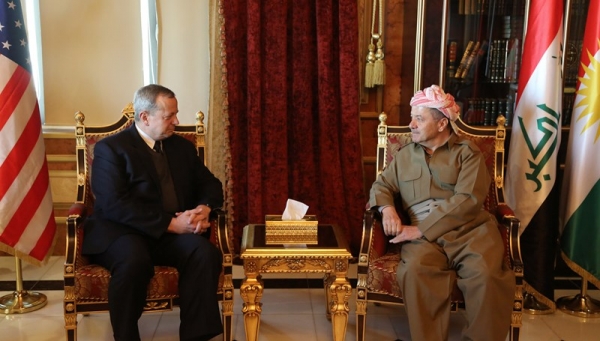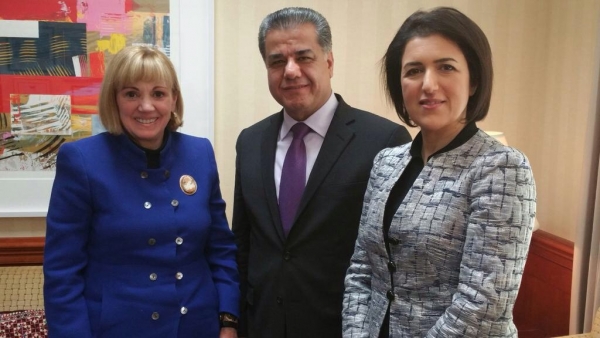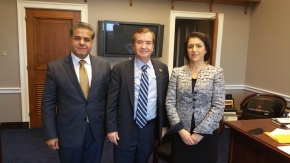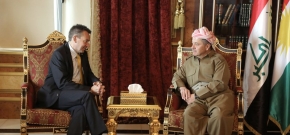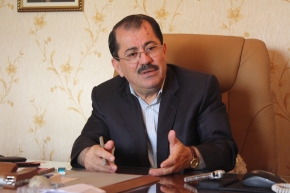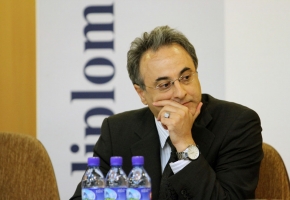President Barzani Meets President Obama’s Envoy for Coalition against ISIS
Kurdistan Region President Masoud Barzani met with the US Special Presidential Envoy for the Global Coalition to Counter ISIL, General John Allen, in Salahaddin today.
General Allen congratulated the recent military successes by peshmerga forces against the ISIS terrorists and commended the leadership and personal supervision of President Barzani in these operations, in particular the breaking of the Mount Sinjar siege and the liberation of the towns of Zummar and Rabia. He added that other countries in the international coalition against ISIS are also all very impressed by the bravery and the sacrifices of the peshmerga forces in the fight against ISIS.
General Allen welcomed the recent military cooperation between Erbil and Baghdad, and reiterated that the United States would continue to support the peshmerga forces.
President Barzani thanked the Unites States, and other coalition countries, for their military support for the peshmerga forces, adding that the people of Kurdistan are very encouraged to have a good friend like the United States behind them. He said that the recent terror attacks in Paris prove that terrorist is a global threat and it needs a global response.
The President and the US Envoy, who was accompanied by US Deputy Assistant Secretary of State Brett McGurk and US Ambassador to Iraq Stuart Jones, also discussed ways of further cooperation in the fight against terrorism, and the military requirements of the peshmerga forces.
Head of DFR and new Representative in Washington strengthen bilateral ties with US
Washington, DC, USA (dfr.gov.krd) - Minister Falah Mustafa Bakir , Head of the Department of Foreign Relations, and the newly appointed Representative to the United States, Bayan Sami Abdul Rahman, concluded their week-long round of meetings in Washington DC by seeing officials at the White House and State Department.
The Kurdistan Regional Government delegation has been in the US capital to introduce the new Representative and to update the Administration, Congress, media and business community on developments in Kurdistan and Iraq.
Four key White House advisors met with Minister Bakir and Ms Abdul Rahman on Thursday to discuss the growing collaboration between the KRG and the US in the fight against terrorism. 'The US has long been an important, strategic ally of the people of the Kurdistan Region,' Mr Bakir told the team from both the President and Vice-President's offices. Ms Abdul Rahman said, ‘As the KRG Representative here in Washington, I will continue to build the strategic partnership between our people, on all fronts.’
Philip Gordon, a special assistant to President Barack Obama and the White House coordinator for the Middle East, welcomed Ms Abdul Rahman and said he was encouraged by the presence of the KRG office in Washington and frequent visits by Minister Bakir. He recognised and thanked the peshmerga for their dedication and sacrifices in combating the Islamic State in Iraq and the Levant (ISIL).
Also at the meeting were Colin Kahl,Deputy Assistant to the President and National Security Advisor to Vice President Joe Biden; Robert Malley, Senior Director of the National Security Council; and Andy Kim, Iraq Director at the National Security Council.
The two sides discussed the political progress in Baghdad under Prime Minister Haider Al-Abadi and the current debate in the Iraqi parliament on the budget law which for the first time allocates funds for the peshmerga as part of Iraq's defence system. They also talked about security developments as the peshmerga regain all Kurdistani territories and the continuing humanitarian crisis.
The delegation also met with senior officials on Friday at the State Department to discuss the issues of internally displaced persons (IDPs) and refugees, US support for the peshmerga, and the recent negotiations between Erbil and Baghdad.
The Assistant Secretary of State for Near Eastern Affairs, Ambassador Anne Patterson, updated the delegates on US efforts to combat ISIL and praised the peshmerga for their successes in Sinjar.
In a separate meeting at the State Department, Kelly Tallman Clements, the Deputy Assistant Secretary for the Bureau of Population, Refugees and Migration, expressed her concern for the 1million people displaced into the Kurdistan Region since last year who joined the 1million or so fellow Iraqis and Syrians who had been sheltering in Kurdistan before that. Minister Bakir thanked the US for its support, but said that aid from the international community needs to continue, especially through the cold winter months.
Minister Bakir and Representative Abdul Rahman also met General Jim Jones, a friend of Kurdistan since 1991 who is now chief executive of the US-Kurdistan Business Council. They discussed Kurdistan's economic recovery in 2015 and ways to expand commercial ties between the two countries.
The KRG delegation continued its introductory meetings on Capitol Hill, including with members of the House and Senate Armed Services Committees, Senate Foreign Relations Committee, and House Committee on Appropriations. Speaking on the growing cooperation between KRG, US, and Iraqi forces, Senator Pat Roberts said, ‘If we are to be successful in Iraq, the Kurds will lead the way.’
These meetings came at the end of a week-long round of talks by the KRG delegation with congressmen and senators who sit on key committees or are interested in Kurdistan, Iraq and the Middle East. The Minister and Representative also called on the Iraqi Ambassador, Lukman Faily, met with the KRG Representation team in Washington and spoke to the media.
KRG delegation holds talks with Department of Defense and Capitol Hill
Washington DC, USA (dfr.gov.krd) - A Kurdistan Regional Government delegation held meetings with the Department of Defense, congressmen and senators in Washington DC on Thursday to discuss the latest developments in the fight against ISIL and the humanitarian crisis in Kurdistan.
In a key meeting with Lisa Kenna, Deputy Assistant Secretary of Defense for Policy, and her colleagues at the Department of Defense, Minister Falah Mustafa Bakir, Head of the Department of Foreign Relations, said, ‘The peshmerga are a competent, coherent force and they have retaken almost all the territory lost to the terrorists in the summer. The peshmerga are the boots on the ground and are winning thanks to the help of the US and coalition airstrikes. We need your support for the long term to turn the peshmerga into a national force.'
Since August, the US has conducted over 1,600 of airstrikes targeting the Islamic State in in Iraq and the Levant (ISIL).
Minister Bakir also introduced Bayan Sami Abdul Rahman, the new KRG Representative to the United States, who thanked the Pentagon for its timely and critical assistance. Minister Bakir was in Washington to introduce the Representative and to update the Administration and Congress on the political, humanitarian and security situation in Kurdistan and Iraq.
The KRG delegation repeated its request for heavy, advanced weapons as well as equipment to counter mines and unexploded devices, and training for the peshmerga.
The delegation also held a meeting with the Chairman of the House Foreign Affairs Committee, Ed Royce. In December, Chairman Royce introduced a bill that would allow the US to directly arm and train Kurdish peshmerga forces. The Congressman told the delegation, ‘We are working to get the peshmerga the tools they need to defeat ISIL,' he said.
Although the Congressman’s bill has not been voted on, Congress has passed other measures to bring defence equipment to the peshmerga, including the Iraq Train and Equip Fund which passed as part of the National Defence Authorisation Act.
Mr Bakir and Ms Abdul Rahman also talked with Congresswoman Tulsi Gabbard and Congressman Adam Kinzinger, both of whom are on the House Foreign Affairs Committee.
At the Senate, the KRG delegation spoke to Jim Inhofe, senior member of the Senate Armed Services Committee who also supports arming and training the peshmerga. 'The Kurds in Iraq have proven themselves to be fierce fighters in combatting ISIL,' he said. 'Providing them with the necessary weapons and equipment will be key to enabling them to successfully defeat this well-funded and organised terrorist organisation.'
In all its meetings, the KRG delegation also outlined the severe winter conditions now facing the internally displaced people (IDPs) and refugees from Syria in Kurdistan and the particular targeting of ethnic and religious minorities by ISIL. They thanked America for its contribution towards the relief effort and asked that it continue to do so.
Minister Bakir said, 'We are pleased to have so many friends who support the development of the KRG and have shown solidarity and support in the fight against ISIL as well as support for the KRG's efforts to help the IDPs and refugees.'
There are about 2 million refugees and IDPs, stretching Kurdistan's services to the limit. These issues were highlighted in talks with Senators Ron Johnson and Pat Roberts and Congressmen Adam Smith, Kay Granger and Nita Lowey. Earlier in the week, the delegation met several congressmen and senators, including Congressmen Dana Rohrabacher and Steve King, as well as the senior staff of some of the committees.
President Barzani Meets ICRC President Peter Maurer
Kurdistan Region President Masoud Barzani met with the President of the International Committee of the Red Cross, Peter Maurer, in Salahaddin today.
The ICRC President briefed President Barzani about their operations in the Kurdistan, in particular their regular visits to detention centers, providing aid to the civilians in conflict zones, and their efforts to help IDPs return to their liberated towns and villages. He expressed his appreciation to the KRG for its close cooperation with ICRC local staff and hoped that this cooperation would continue.
President Barzani expressed full KRG support for the work that ICRC has been conducting in the Kurdistan Region and pledged continued support for their operations. He also reiterated KRG commitment to international humanitarian laws and welcomed ICRC’s efforts to help IDPs return to their homes.
Nazem Dabbagh Talk with JARAS: the fall Kubani will Cause insecurity in the Regional Countries
To analyze the current situations of Kubani and the regional countries’ positions toward this crisis, JARAS went to Nazem Dabbagh the official representative KRG of Iraq in Iran. The main says as followed:
In the response to the first question he answered: the concern of Kubani is sensitive and the governments wanting ISIS to win should consider that if it happens so, it will cause insecurity in their countries. It is already experienced that when the security and intelligence agencies look for to create a crisis the outcome of it does aim themselves, since after the coalition formed the attacks of ISIS have got more. He alerted that the fall of Kubani will follow critical results. Thus the regional countries have to become alert and know that the terrorists just work for their benefit and cannot meet the countries’ needs supporting them.
Concerning the helps from Kurdistan Region of Iraq to Kubanian people, Dabbagh said: there are two concerns about this. One is the geography of Kubani which the only way to reach it is through Turkey borders but Turkey has shut the Kubani entrances, whereas, in letter the president of the KRG of Iraq has asked Turkey to give the permission to help Kubanian people.
Dabbagh considers Turkey policy to close the borders and to prevent P.K.K Kurds from entering Kubani as binary policy. On the one hand Ahmad Davoud Ughlu the prime minister of Turkey said they will not allow Kubani to be occupied by ISIS. On the other hand the president of the country states that Kubani has fallen and ISIS has occupied it. In addition Dabbagh know it illogical and unfair of Erdugan to consider P.K.K and ISIS the same, since Dabbagh belies that they are naturally different.
As continuing Dabbagh said: the airstrike simply cannot cause ISIS to be defeated so land attack is needed. These attacks don’t have to be just superficial and to weaken ISIS but it must be strictly and aim to completely destroy it. At last Dabbagh Said: As I.R.Iran has not failed to help Syrian and Iraqi people, it should also interfere in Kubani concern.
Shargh Press Talk with Muhammad Seddigh Ahmad (Jegarkhowein): ISIS will be Toppled by the Political Coalition in Iraq
Dr. Muhammad Seddigh Ahmad in a response to question concerning the roots of the emergence of ISIS believes the roots of it should be sought in its roots.
The root of the emergence of ISIS is the central government of Iraq fault of neglecting democracy strategies and of not considering ballots and thoughts of groups. By this way of the government not only the former problems were not solved, but also caused lots of new problems of which the most important one was ISIS. Dr.Ahmad also believes that after 80 or 90 years established of Iraq government it was tried to form a democratic structure, but despite of the declaration of the Constitutes and the potentials of current governors of Iraq there is not so difference as compared to the formers.
The deputy-representative of KRG in Iran said that the most important reason of not resisting ISIS was public discontent among Sunnite, thus it caused them not to confront ISIS. Even some tribes not only resisted but they also supported ISIS. In addition to frightening actions of ISIS, Iraq authorities uncaring concerning the danger of ISIS infiltration in Iraq army and the possibility of some military elements’ betrayal can be deemed as one the reasons for ISIS to get stronger.
Dr. Ahmad considered the occupation of some Kurdish regions abandoned by the Iraq army against ISIS as the protection of those regions. Indeed these regions are Kurdish and under the KRG and the government dispute. But as the army escaped the regions got endangered by ISIS so Pishmerga forces presented in there to halt ISIS from occupying. Besides he knew ISIS limited infiltration in the Kurdish region for their being equipped with heavy weapons as Pishmergas having just light ones and for possible mismanagements.
Dr. Ahmad also mentioned the civilization ties between Iran and Kurds and said Iran’s help was on time and got appreciated by the president of the region. Nevertheless he believes that Turkey’s position to ISIS will not cause to be put aside from the KRG’s foreign policy, but the KRG wants to keep balance on its foreign policy. Furthermore in a part of his phrases he mentioned America’s attack against ISIS and said these attacks were workable to ISIS to withdraw.
Dr. Ahmad in response to the questions considered Jalal Talibani as a fighter leader and qualified president of Kurd, Masoud Barzani as the symbol of freedom, peace and democracy of Kurdistan nation, Ayatollah Sistani as the respected and impressive personification of the Islamic world, Ammar Hakim as the reminder of moderate leadership of Shia, Fuad Masum As the revolutionary and experienced politician and Ghasem Soleimani as a very powerful and impressive personification in foreign policy of Iran. At last Dr. Ahmad expressed hope concerning ISIS to be defeated and peace to return the country.
Nazem Dabbagh: The Soleimanieh Airport and Office did not Know of the Russian Airplane
Nazem Dabbagh the representative of Kurdistan Regional Government of Iraq in Tehran in a talk with Fars Press concerning the arrest of Russian airplane in Soleimanieh airport said: Soleimanieh Airport and Office did not have any information about the Russian airplane and for this, they were not given permitted to land, and now in Baghdad the research is still being conducted.
About this I have no information but in general when such incident happen relating to weapons, some suspected as accused will be investigated to uncover the facts.
Nazem Dabbagh in the Talk with Shargh Press: Iran’s Aids to Region is Logistic and Consultative
Concerning the relations between Kurdistan Regional Government (KRG) and Iran, Shargh Press had an interview with Nazem Dabbagh the representative of KRG of Iraq in Iran whose outlines follow:
About Mr. Larijani’s travel to the Region he said: Iran has proved that in tough situations it has been supporter and enthusiast of Iraq and the Region’s people and will still be. Mr. Larijani also in this travel insisted in strengthening the relations between Iran and the Region. That was why he came to Baghdad and then Soleimaniya and Erbil to express the development of relationship and alliance. He added after Saeidlu’s travel the former vice-president, Mr. Larijani’s travel to Erbil was the second important of an Iranian authority. Mr. Larijani is the senior authority of Iran visiting the Parliament of Kurdistan Region. All express the resistance, cooperation and support of Iran beside Kurdistan Region and Iraq as well as their high importance for Iran.
About Iran’s aids to the Region to confront ISIS he said that Iran has always delivered its contributions to the Region in a proper conditions. He also said: if we need any helps in the field of logistic and consultative they give us and as of a yet they have.
About the positions of the Region authorities about the separation of Iraq he said; the authorities have not announce yet that the region is to separate, instead we are obedient to the constitutton of Iraq. However the emergence of ISIS has caused Iraq automatically get separated, namely; the geographical region of ISIS is located between Iraq and Kurdistan Region. That was why ISIS itself got generated as a result of Iraq mismanagement. We said if you desire a unified Iraq you have to follow the constitution of Iraq. We always say this that if we want to dissolve the concerns we need to be obedient to the constitution. However when the central do not accept this what can we do?
Indeed Dabbagh specified that the root of how ISIS to emerge should be sought in the central government and the wrong policy of Maliki in political management.
Nazem Dabbagh in a Talk with Asia Press: Today the Oil Map Has lied on Kurdistan Region
About the concern of oil of Kurdistan Region and its policies concerning the oil Asia Press had an interview of which main points follow:
Relating how to commence the oil works Dabbagh said at the time of Saddam Hussein there was only one active oil center in Kurdistan and for some reasons he blocked all oil wells of Kurdistan Region by concrete. After his withdraw Kurdish activists reopened them by exploding the concrete and tried oil economy enjoyed good advances.
In a response to a question about being obedient of Kurdistan Region to Iraq codes while stating the ups and downs of the relations between KRG and central government. Dabbagh Said: we considered the constitution of Iraq according which we could provide the budget of the Region. When the Iraq government cut the budget of the Region, before that we have come to conclusion to export the oil through the present oil pipes stretching from Kurdistan to Turkey and this way the production of oil will reach 550 thousand barrels a day. Today the oil map of the world has laid on Kurdistan Region and Kurdistan of Iraq will draw this map. In addition dealing with the potentials of Iran to import oil from Kurdistan specially to export oil to Kermanshah and its being delivered in another place Dabbagh said they to export oil they are joined to Jeyhan port in Turkey and we export 200 thousand oil barrels through this way. He added; in my opinion the policy come from the oil pipelines and now if we could not export oil to the world we would not have this place. Presently we are observing the descendant of the oil price from $100 to $60 we witness that policy has entered it. There is no world war not export oil.
After explicitly stating that in oil policy we are obedient to the Region interests Dabbagh said: according to the constitution of Iraq we work, those cases I primarily mentioned relate to the Iraq government. According to this we decide and never interfere, therefore if we have an independent government we will talk then what policy should we take to Russia, USA or even Iran.
About the outcome of Erbil-Baghdad in recent days he said: we have come to an agreement to continue this bilateral negotiation. At the beginning we will export 250 thousand oil barrels from the Region as well as 350 thousand from Kirkuk. In addition $1 billion dollars from oil income has been assigned to Pishmerga forces to defend till devote one of its actions to preserve oil fields.
Prime Minister Barzani visits West of Tigris and Zummar frontlines
Erbil, Kurdistan Region, Iraq, (KRG.org) - Kurdistan Region Prime Minister, Nechirvan Barzani, yesterday visited the Peshmerga forces, fighting against the Islamic State terrorist organization, known as ISIS, on the West side of River Tigris in Sihailah and Zummar frontline.
In a meeting with the military commanders and officers of the two sectors of the front, Prime Minister Barzani was briefed and updated on the latest military developments on the front, the continuous advances of Peshmerga forces and their recent victories in repelling ISIS terrorists. He also followed up the Peshmerga forces’ needs and logistics in the battlefront.
The meeting was followed by a visit by Prime Minister Barzani to the town of Zummar, where he visited the local branch offices of both the Kurdistan Democratic Party and Patriotic Union of Kurdistan, the only two Kurdish political parties who returned to their offices in Zummar after the liberation of the town from ISIS terrorists, earlier last month.
The Prime Minister met both parties’ officials and discussed the situation in the area, the ways to ensure the return of the displaced people to the town and the provision of basic services, particularly electricity power. The Prime Minister stressed that he will urge the relevant authorities to resolve these issues, as soon as possible, to ensure the return of all public services to the area.
Prime Minister Barzani also visited the main office of Nineveh Oil Board and the Northern Oil Company in Ain Zala, meeting the directors and supervisors of both the board and the company.
They discussed the situation in the area, the nature of the work, and the importance of protecting such infrastructure following its liberation from ISIS terrorists.
More...
Minister Bakir and Representative Abdul Rahman call on State Department and Congress
Latest News
- President Erdoğan reaffirms Türkiye’s continued support for Iraq and the Kurdistan Region
- President Nechirvan Barzani’s message on the 126th anniversary of Kurdish journalism
- President Nechirvan Barzani at the Sulaimani Forum: The country must bring us all together
- President Nechirvan Barzani meets with European Union Ambassador
- President Nechirvan Barzani receives French Ambassador
- President Nechirvan Barzani visits Iranian Consulate General to pay respects to victims of Kerman terrorist attack
- President Nechirvan Barzani receives outgoing French Ambassador
- President Nechirvan Barzani condemns terrorist bombings in Iran
- President Nechirvan Barzani meets with US Deputy Secretary of State
- President Nechirvan Barzani’s New Year Address
- KRG Prime Minister Meets with US Deputy Secretary of State
- KRG Prime Minister Engages in Key Talks with UNAMI Chief
- KRG Prime Minister Hosts Diplomats from Iraq and Kurdistan Region
- KRG Prime Minister Meets with the UN’s Secretary-General at COP28
- President Nechirvan Barzani meets with Turkish Ambassador
- KRG Prime Minister Welcomes UK Military Delegation
- President Nechirvan Barzani meets with UK Chief of the Defense Staff’s Senior Middle East Advisor
- KRG Prime Minister Discusses Regional Issues and Domestic Policies in Special Panel
- KRG Prime Minister Meets with Former British Prime Minister
- MEPS Forum in Duhok Highlights Climate Change Among Key Global Challenges
- KRG Prime Minister Meets with United Nations Delegation
- President Nechirvan Barzani and French Ambassador discuss the situation in Iraq and the region
- President Nechirvan Barzani meets with Head of the Independent Strategic Review of UNAMI
- KRG Prime Minister Inaugurates 5th International Trade Fair for Industry and Construction
- KRG Prime Minister Meets Qatar's Consul General
- President Nechirvan Barzani meets with Iraq’s Oil Minister
- KRG Prime Minister Welcomes Cardinal Sako of the Chaldean Catholic Church
- KRG Prime Minister Meets with Iraq's Energy Officials
- KRG Prime Minister Meets with British Ambassador
- President Nechirvan Barzani meets with UK Ambassador to Iraq

